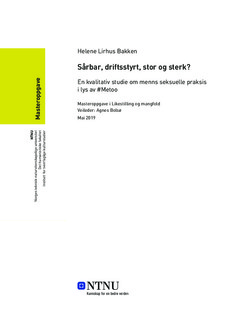| dc.contributor.advisor | Agnes Bolsø | |
| dc.contributor.author | Helene Lirhus Bakken | |
| dc.date.accessioned | 2019-09-06T14:00:12Z | |
| dc.date.available | 2019-09-06T14:00:12Z | |
| dc.date.issued | 2019 | |
| dc.identifier.uri | http://hdl.handle.net/11250/2613020 | |
| dc.description.abstract | I etterkant av #Metoo dannet det seg et veiskille: de som omfavnet #Metoo med entusiasme over at omfanget av seksuell trakassering endelig ble offentliggjort, og de som ikke kjente seg igjen i kampanjen. Dette utfoldet seg i utallige kronikker, leserinnlegg og debatter om temaet. Derfor har jeg valgt å undersøke hvordan menn snakker om sin seksuelle praksis i etterkant av #Metoo.
Kritisk diskurspsykologi og Nigel Edley sitt analysekonsept som består av fortolkningsrepertoar, ideologisk dilemma og subjekt posisjon danner grunnlaget for analysen i dette prosjektet. Jeg har utført 5 kvalitative intervjuer med mannlige studenter om deres seksuelle praksis. Det teoretiske utgangspunktet for prosjektet har vært hegemonisk maskulinitet, maskulin dominans og mannlighet- og umannlighetsforståelse. Formålet med prosjektet har vært å undersøke hvilke fortellinger, tanker og erfaringer informantene har gjort i forbindelse med sin seksuelle praksis.
Funnene viser at informantene i den første delen forstår seg selv som maskuline med en naturlig dominans over kvinner. Dominansen er begrunnet i en biologisk overlegenhet som gjør at dem er utrakasserbar og usårlig. Begrepene stor, sterk, og driftsstyrt er sentrale i måten informantene forstår seg selv som mektig ovenfor kvinner. I den andre delen er informantenes sårbare side skrevet frem som i konflikt med måten informantene forstår seg som mannlige. Her er det en balansegang mellom det å være mannlig og umannlig ved måten informantene forteller om seksuell trakassering, kommunikasjon og overgrep. I den tredje delen er informantens forståelse av #Metoo- kampanjen skrevet frem som et kritisk blikk på kampanjen. Politisk korrekthet og krenkekultur er måten informantene beskriver tiden i etterkant av #Metoo. I den fjerde og siste delen er det skrevet frem måten informantene snakker om sex. I situasjoner med ereksjonssvikt er de medfølende og forståelsesfulle, på samme tid som det er grenser for hva de snakker om fordi informantene ikke vil avsløre sin sårbarhet.
Avslutningsvis har jeg skrevet en oppsummering av de samlede trådende i de forbigående analysekapitlene for å se dem i sammenheng med hverandre. Til slutt har jeg skrevet om mine tanker etter å ha arbeidet med prosjektet. | |
| dc.description.abstract | In the aftermaths of the #Metoo movement a crossroad was formed: those whom embraced the #Metoo movement with enthusiasm of the fact that the scope of sexual harassment finally was out in the open, and those whom did not acknowledge the movement. This unfolded in countless articles, cornicles, letters and debates about the topic. This is why I have chosen to investigate how men talk about their sexual practice in the aftermaths of the movement.
Critical discourse psychology and Nigel Edley´s concept of analysis contains of interpretation repertoire, ideological dilemma and subject position that form the basis for the analysis in the project. I have conducted five qualitative interviews with male students about their sexual practice. The theoretical base for the project has been hegemonic masculinity, masculine dominance and the understanding of manliness- and unmanliness. The purpose of the project has been to examine what narratives, thoughts and experience these informants have formed in connection to their sexual practice.
The findings show that in the first section the informants understand themselves as masculine with a natural dominance over women. The dominance is reasoned by the biological superiority that makes them unharrassable and unharmable. The concepts big, strong and sexually driven are central in the ways in which the informants see themselves as powerful in relation to women. In the second section, the informant’s vulnerable side is formulated in the way it is in conflict with the way the informants understanding of themselves as manly. Here a balance between being manly versus unmanly in the way that the informants talk about sexual harassment, communication and abuse. In the third section the informants understanding of the #Metoo movement is formulated as a critical assessment of the movement. Political correctness and the formation of a culture that makes people ´easily offended´ is main elements in the aftermaths of #Metoo. In the fourth and last section, the ways in with the informants talk about sex is examined. In situations where erectile dysfunction is debated, the informants seem understanding and compassionate. While they at the same time boundaries of what they talk about is present, in a trial to not reveal their vulnerability.
In conclusion I have written a summary of the many threads in the previous analysis chapters in order to see them in context to each other. Finally, I have written my thoughts after completing the project. | |
| dc.language | nob | |
| dc.publisher | NTNU | |
| dc.title | Sårbar, driftsstyrt, stor og sterk? | |
| dc.type | Master thesis | |
